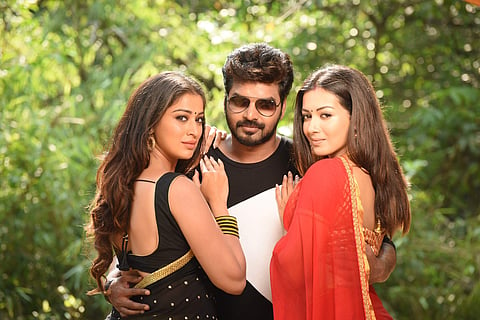Neeya 2 Movie Review: This pretend sequel has no bite
Rating:(1.5 / 5)
It appears that the makers of Neeya 2 got very different things out of the 1979 Kamal Haasan-Sripriya film, Neeya, than I did. In a simplistic sense, that hit film was about men wading into animal space and leaving them the worse for it. It was about Kamal outwitting his adversary, a serpent-woman. It was ultimately about a wronged woman seeking vengeance — and getting it, you could argue. But here’s what Neeya 2 has plucked out of it: It has borrowed the Ore Jeevan song. It has borrowed the idea of a serpent-woman. It has borrowed the idea of having two heroines (given the scope of Varalaxmi Sarathkumar’s role, I’m not including her as a third) — and this is something director L Suresh seems particularly thrilled about. It shows in how the masala trope of two women desperately coveting one man, has been adopted. Two female characters — played by Raai Laxmi and Catherine Tresa — being unable to keep their hands off the hero (Jai), and the pretense of a sequel, seem to have convinced them all that this could be a winning idea.
Cast: Jai, Catherine Tresa, Raai Laxmi, Varalaxmi Sarathkumar
Director: L Suresh
I imagine that part of the idea of having Divya (Catherine Tresa) and Malar (Raai Laxmi) throw themselves at Sarva/Vikram (Jai) is to act as wish fulfillment, in a sense. There’s some rationale for why Malar can’t let him go, but Divya loves him because… well, even she doesn’t truly understand why. At one point, she says that despite so many men making advances, she is smitten by Sarva. I suppose the film’s explanation for it is vidhi — one of the two funny priests in this film talks at length about how it’s futile to understand vidhi, and how it can only be experienced. It’s probably a bit like this film itself. No matter how much I write about it, you won’t truly understand till you experience it.
Also, I sincerely hope Divya’s characterisation isn’t this film’s idea of feminism. She does the sort of dogged, distasteful pursuing long romanticised by our directors. She follows Sarva around, despite his pleas to the contrary. She once even threatens — as a ‘joke’ — to throw acid on him, if he were to continue refusing her. In another disturbing attempt at a joke, another character (Bala Saravanan) says, “Oruthan thaan uyiraa nenaikkara ponnu, innoruthana paathaa, konnuduvaan.” Anyway, Sarva has this creepy stalker at one end, and a serpent-woman who claims she was married to him in his previous birth, at the other. There’s no wish fulfillment here; just a frightening no-win situation for a man.
There is one redeeming aspect though. The people in this film seem abnormally kind to the murderous serpent. In one particular scene, it makes no effort to hide its intention of brutalising Divya, and gets surrounded by the locals. But the naïve, kind-hearted people simply capture it in a barrel, from where it happily escapes and kills a few more. This is a mass snake in that sense. It has an introduction fight scene, the like of which is usually reserved for our heroes. It’s a Vedhalam-like transformation in conception, but Anbavanan Asaradhavan Adangadhavan-esque in execution. This snake is shown to attack the aggressors with such potency that they fly into walls, as though struck by Baasha in that famous interval sequence. It’s a film whose serious scenes are hilarious and comedy scenes are frightening. Its serious portrayal of snake vision as images — blurry at the edges, and split into honeycomb shapes, reminiscent of scales — is quite funny. Meanwhile, its idea of a joke is to have the serpent-woman be drugged by a man who hopes to rape her. He lies down next to her unconscious body, and begins sliding his hands up her legs, commenting on how fair she is. It’s impossible not to shudder. Its idea of a dead-serious song is when the almost EDM-sounding Va Sagee kicks in at a time when you are supposed to feel the dread of a serpent-woman beguiling an innocent man. Its idea of dead-serious redemption is to have one woman suck the poison off another’s feet. There’s no way I’m going to believe this film doesn’t know what it is doing.
And you have to work so hard to suspend your disbelief for this film. You need to believe that a jadhagam mean something, that a naaga dosham means something, that a thaayathu means something, that funny-looking priests know what they are talking about, that a serpent-woman really believes that the best way to look for a person is to point at a pencil drawing and ask strange men in crowded markets about him… You put in so much faith, and what do you get in return? The film hissing all over you.

